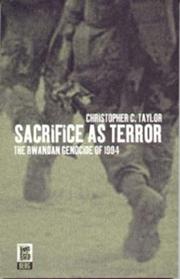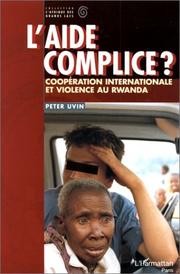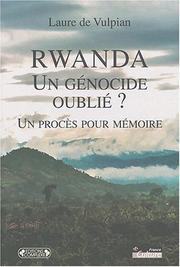| Listing 1 - 10 of 38 | << page >> |
Sort by
|
Book
ISBN: 9782930333403 2930333405 2930333405 Year: 2010 Publisher: Bruxelles: MEO,
Abstract | Keywords | Export | Availability | Bookmark
 Loading...
Loading...Choose an application
- Reference Manager
- EndNote
- RefWorks (Direct export to RefWorks)
Génocide des Tutsi (1994) --- Tutsi (peuple d'Afrique) --- Récits personnels tutsi

ISBN: 185973278X 1859732739 Year: 1999 Publisher: Oxford New York Berg
Abstract | Keywords | Export | Availability | Bookmark
 Loading...
Loading...Choose an application
- Reference Manager
- EndNote
- RefWorks (Direct export to RefWorks)
Genocide --- Hutu (African people) --- Tutsi (African people) --- Génocide --- Hutu (Peuple d'Afrique) --- Tutsi (Peuple d'Afrique) --- Rwanda --- History --- Ethnic relations --- Histoire --- Relations interethniques --- Civil war, 1994
Book
ISBN: 9782872672097 2872672095 Year: 2018 Publisher: Cuesmes Editions du Cerisier
Abstract | Keywords | Export | Availability | Bookmark
 Loading...
Loading...Choose an application
- Reference Manager
- EndNote
- RefWorks (Direct export to RefWorks)
De sa jeunesse insouciante et joyeuse jusqu'au génocide en 1994, en poursuivant avec une vie à construire à Bruxelles, le récit de Félicité nous touche par les questions qui, au-delà de l'horreur, restent en suspens. Comment rendre justice ? Comment en finir avec le négationnisme ? Comment transmettre cette histoire à ses quatre enfants ? Le besoin de savoir, de comprendre devient obsédant. Les réponses à mes questions, je ne les trouverai pas dans les livres, pas toutes en tous cas. Ce que je cherche ? Je veux combler les trous de mémoire, corriger les distorsions, réunir les versions aussi bien de rescapés que de tueurs. J'ignore si ce droit m'est donné, mais je le prends ! À défaut de rite funéraire pour ma famille, j'invente le mien : un rite à la recherche de la vérité... Ce projet s'est concrétisé en avril 2015. Je me suis donc rendue deux semaines au Rwanda, accompagnée de Nathalie, lancée avec moi dans un voyage mémoriel. Vingt et un ans après les faits. J'ai trente-sept ans.
Tutsi (African people) --- Crimes against --- History --- Lyamukuru, Félicité --- Rwanda --- Atrocities --- Tutsi (African people) - Crimes against - Rwanda - History - 20th century --- Rwanda - History - Civil War, 1994 - Personal narratives --- Rwanda - History - Civil War, 1994 - Atrocities
Book
ISBN: 9782315009572 231500957X Year: 2020 Publisher: [Paris] Max Milo
Abstract | Keywords | Export | Availability | Bookmark
 Loading...
Loading...Choose an application
- Reference Manager
- EndNote
- RefWorks (Direct export to RefWorks)
Ce livre d'investigation époustouflant a été réalisé par une journaliste au péril de sa vie. Il repose sur des centaines d'entretiens - déserteurs de l'armée rwandaise au pouvoir, anciens soldats, survivants d'atrocités, enquêteurs de l'ONU - et sur des documents issus du Tribunal pénal international pour le Rwanda qui sont reproduits en annexe du livre. Judi Rever apporte un éclairage profondément troublant sur le génocide rwandais, qui met en lumière l'importance du rôle du chef de l'État actuel, Paul Kagame.
Political parties --- Polemology --- Rwanda --- Génocide des Tutsi (1994) --- Genocide --- Politique et gouvernement --- Kagamé, Paul --- Kagamé, Paul, --- Front patriotique rwandais. --- Atrocités. --- Politics and government --- History --- Atrocities. --- Génocide des Tutsi (1994) --- Kagamé, Paul
Book
ISBN: 2738459587 Year: 1998 Volume: *4 Publisher: Paris Harmattan
Abstract | Keywords | Export | Availability | Bookmark
 Loading...
Loading...Choose an application
- Reference Manager
- EndNote
- RefWorks (Direct export to RefWorks)
Political systems --- National movements --- Burundi --- Hutu (African people) --- Massacres --- Tutsi (African people) --- History --- Ethnic relations --- Politics and government

ISBN: 2738473377 9782738473370 Year: 1999 Publisher: Paris Harmattan
Abstract | Keywords | Export | Availability | Bookmark
 Loading...
Loading...Choose an application
- Reference Manager
- EndNote
- RefWorks (Direct export to RefWorks)
Ce livre explore la dramatique contradiction qu'a été le génocide dans un pays considéré comme un modèle de développement par les institutions financières internationales. La première partie aborde les années 1990 et les dynamiques de militarisation et de polarisation qui ont directement conduit au génocide. L'auteur montre comment " l'entreprise " de la coopération a réagi ou n'a pas réagi à ces dynamiques. La seconde partie étudie la base structurelle profonde sur laquelle a été construit l'édifice génocidaire. L'auteur analyse les processus d'inégalité, d'exclusion et d'humiliation qui ont caractérisé la vie sociale et économique du Rwanda. Comment la coopération au développement a-t-elle pu ignorer et renforcer ces caractéristiques de violence structurelle ? Comment les bailleurs de fonds se sont-ils avancés dans un tel contexte ? En éclairant la relation "aide au développement et conflit violent", l'auteur oblige à repenser le paradigme du développement.
Internal politics --- Community organization --- Political sociology --- Sociology of minorities --- Development aid. Development cooperation --- Rwanda --- Genocide --- Economic assistance --- Tutsi (African people) --- Génocide --- Aide économique --- Crimes contre les Tutsi (Peuple d'Afrique) --- Crimes against --- History --- Histoire --- Economic conditions --- Ethnic relations --- Conditions économiques --- Relations interethniques --- Tutsi (Peuple d'Afrique) --- Crimes contre --- Génocide --- Aide économique --- Conditions économiques --- 20th century --- Coopération au développement --- Développement --- Crise --- Violence structurelle --- Société civile --- Ethnicité --- Racisme
Book
ISSN: 07680066 ISBN: 9782130748731 2130748732 Year: 2017 Volume: 4062 Publisher: Paris Presses universitaires de France
Abstract | Keywords | Export | Availability | Bookmark
 Loading...
Loading...Choose an application
- Reference Manager
- EndNote
- RefWorks (Direct export to RefWorks)
Le génocide perpétré au Rwanda d’avril à juillet 1994 a été exceptionnel par son envergure, sa rapidité et son mode opératoire : plus d’un demi-million de Tutsi ont été exterminés en cent jours. Les victimes sont généralement tombées sous les coups d’un très grand nombre d’assassins ayant eu recours à des armes rudimentaires. Quels ont été les ressorts d’une telle tragédie ? Quelles en ont été les causes, lointaines ou plus immédiates ? Comment s’est-elle déroulée ? Quelles séquelles a-t-elle laissées ? Ce génocide n’appartient pas qu’à l’histoire : il reste un enjeu politique contemporain, tant au Rwanda qu’ailleurs dans la région et de par le monde, notamment en France. Les débats restent intenses ; les oppositions, souvent violentes. Filip Reyntjens, en s’appuyant sur des faits communément admis, offre des clés de lecture pour une interprétation plus sobre de ce qu’on a appelé le «dernier génocide du XXe siècle».
Sociology of minorities --- National movements --- anno 1990-1999 --- Rwanda --- Genocide --- Tutsi (African people) --- Hutu (African people) --- History --- Crimes against --- Politics and government --- France --- Ethnic relations --- Relations --- Génocide --- Tutsi (Peuple d'Afrique) --- Crimes contre --- Histoire --- Atrocities --- Atrocités --- Génocide --- Atrocités --- Atrocities. --- Genocide - Rwanda - History - 20th century --- Tutsi (African people) - Crimes against - Rwanda - History - 20th century --- Hutu (African people) - Rwanda - Politics and government - 20th century --- Rwanda - Ethnic relations - History - 20th century --- Rwanda - Relations - France --- France - Relations - Rwanda
Book
ISBN: 9780739112298 9780739147627 0739112295 0739147625 1282561936 9781282561939 9786612561931 6612561939 0739147625 Year: 2010 Volume: *3 Publisher: Lanham, Md Lexington
Abstract | Keywords | Export | Availability | Bookmark
 Loading...
Loading...Choose an application
- Reference Manager
- EndNote
- RefWorks (Direct export to RefWorks)
Writing and Filming the Genocide of the Tutsis in Rwanda is a groundbreaking study that puts into dialogue testimonies, literary fictions, and cinematic representations bearing witness to the genocide of the Tutsis in Rwanda. The analysis of the narrative strategies used by survivors, authors, and filmmakers in their attempt to fulfill the duty to remember leads Dauge-Roth to explore the roles that communities and individuals must play in acknowledging survivors' radically different past and their present quest for a shared humanity.
African literature --- Film --- National movements --- anno 1990-1999 --- Rwanda --- Tutsi (African people) --- Crimes against --- History --- Atrocities. --- Literature and the war. --- Motion pictures and the war.

ISBN: 2804800075 9782804800079 Year: 2004 Volume: *24 Publisher: Bruxelles Complexe
Abstract | Keywords | Export | Availability | Bookmark
 Loading...
Loading...Choose an application
- Reference Manager
- EndNote
- RefWorks (Direct export to RefWorks)
Génocides --- Rwanda ; geschiedenis van de twintigste eeuw --- Rwanda ; histoire du vingtième siècle --- Volkenmoorden --- Genocide --- Trials (Genocide) --- Tutsi (African people) --- Hutu (African people) --- Génocide --- Procès (Génocide) --- Crimes contre les Tutsi (Peuple d'Afrique) --- Hutu (Peuple d'Afrique) --- Crimes against --- History --- Politics and government --- Histoire --- Politique et gouvernement --- Rwanda --- Ethnic relations --- Relations interethniques --- War crimes --- Atrocities --- Tutsi (Peuple d'Afrique) --- Crimes contre --- Génocide --- Procès (Génocide) --- Genocide - Rwanda --- Tutsi (African people) - Crimes against - Rwanda --- War crimes - Rwanda --- Rwanda - History - Civil War, 1994 - Atrocities --- Rwanda - Ethnic relations --- Rwanda - Politics and government
Book
ISBN: 9781780683515 9781780687094 1780683510 1780687095 Year: 2016 Volume: 73 Publisher: Cambridge Intersentia
Abstract | Keywords | Export | Availability | Bookmark
 Loading...
Loading...Choose an application
- Reference Manager
- EndNote
- RefWorks (Direct export to RefWorks)
This study deals with the phenomenon of genocide denialism, and in particular how it operates in the context of the genocide against the Tutsi. The term genocide denialism denotes that we are not dealing with a single act or type of (genocide) denial but with a more elaborate process of denial that involves a variety of denialist and denial-like acts that are part of the process of genocide. From this study it becomes clear that the process of genocide thrives on a more elaborate denial dynamic than recognized in expert literature until now. This study consists of three parts. The first theoretical part analyses what the elements of denial and genocide entail and how they are (inter)related. The exploration results in a typology of genocide denialism. This model clarifies the different functions denial performs throughout the process of genocide. It furthermore explains how actors engage in denial and on which rhetorical devices speech acts of denial rely. The second part of the study focuses on denial in practice and it analyses how denial operates in the particular case of the genocide against the Tutsi. The analysis reveals a complex denial dynamic: not only those who perpetrated the genocide are involved in its denial, but also certain Western scholars, journalists, lawyers, etc. The latter were originally not involved in the genocide but recycle (elements of) the denial discourse of the perpetrators. The study addresses the implications of such recycling and discusses whether these actors actually have become involved in the genocidal process. This sheds light on the complex relationship between genocide and denial. The insights gained throughout the first two parts of this study have significant implications for many other actors that through their actions engage with the flow of meaning concerning the specific events in Rwanda or genocide in general. The final part of this study critically reflects on the actions of a variety of actors and their significance in terms of genocide denialism. These actors include scholars from various fields, human rights organisations, the ICTR, and the government of Rwanda. On a more fundamental level this study critically highlights how the revisionist scientific climate, in which knowledge and truth claims are constantly questioned, is favourable to genocide denialism and how the post-modern turn in academia has exacerbated this climate. Ultimately, this study reveals that the phenomenon of genocide denial involves more than perpetrators denying their genocidal crimes and the scope of actors and actions relevant in terms of genocide denialism is much broader than generally assumed.
Polemology --- National movements --- Rwanda --- Denial (Psychology) --- Déni (Psychologie) --- Dénégation (Psychologie) --- Négation (Psychologie) --- Ontkenning (Psychologie) --- Verleugnung (Psychoanalyse) --- Tutsi (African people) --- Genocide --- Crimes against --- History --- 20th century --- Holocaust denial --- Civil war, 1994 --- Atrocities --- Ethnic relations --- Tutsi (African people) - Crimes against --- Genocide - Rwanda --- Crimes against. --- Ruanda.
| Listing 1 - 10 of 38 | << page >> |
Sort by
|

 Search
Search Feedback
Feedback About UniCat
About UniCat  Help
Help News
News